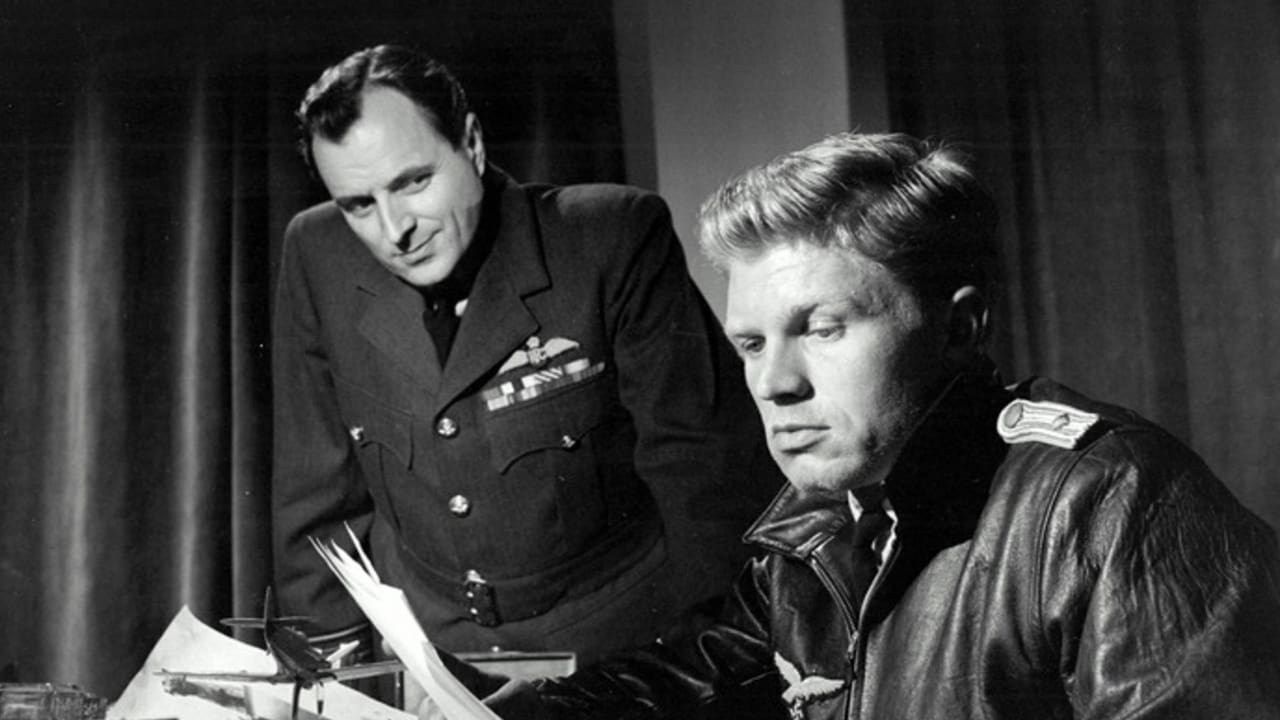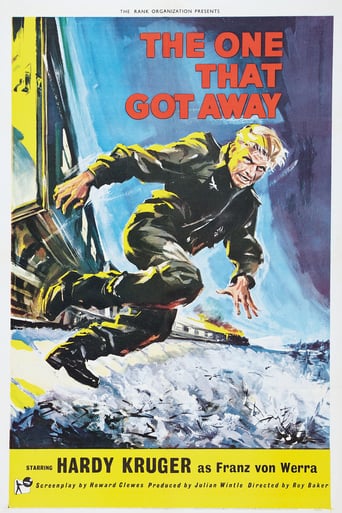

To me, this movie is perfection.
... View MoreIt's the kind of movie you'll want to see a second time with someone who hasn't seen it yet, to remember what it was like to watch it for the first time.
... View MoreI think this is a new genre that they're all sort of working their way through it and haven't got all the kinks worked out yet but it's a genre that works for me.
... View MoreThere are moments that feel comical, some horrific, and some downright inspiring but the tonal shifts hardly matter as the end results come to a film that's perfect for this time.
... View MoreBased on the 1956 book of the same name by Kendal Burt and James Leasor, this is a rather mediocre and pedestrian World War II film. It tells the story of Oberleutnant Franz von Werra, a Luftwaffe pilot who was shot down during the Battle of Britain and secured himself a place in history by becoming the only German POW captured by the British who escaped to Germany. After his first three escapes failed, he was sent to Canada and from there managed to cross the American border before making his way to Mexico. He eventually returned to his native country in April 1941 but did not live to see the end of the war or even the year as he was killed in a plane crash the following October. Von Werra's escape is a great story with which I was somewhat familiar before watching the film. However, the script by Howard Clewes does not do it justice even though I think that it is generally historically accurate. The various escape attempts should be very exciting but they aren't, in large part because the script is not very well structured. Roy Ward Baker is a very talented director and does the best that it can with the material but it's not his best work, I'm afraid.The film stars Hardy Krüger in a great performance as the supremely self-confident von Werra. He brings a great deal of intelligence and charisma to the role but von Werra comes across as rather two- dimensional. He doesn't have much of a personality beyond being clever and self-confident. The only things that we learn about his personal life is that he owns a lion cub named Simba and he seemingly has a girlfriend or fiancée since he carries a photograph of a young women with him. This is nevertheless the closest thing that anyone gets to character development in the film. Otherwise, I would think that Clewes was worried about presenting a German pilot in too positive a light a mere 12 years after the war ended. There is certainly a sense of mutual respect between von Werra and some of the British officers but this is a something that I have seen done much more effectively in other films. Krüger himself could probably relate to von Werra quite a bit. In December 1944, he was drafted into the Wehrmacht at the age of 16 before being drafted into the 38th SS Division Nibelungen the following March. He was captured by the American forces at the end of the war and made three escape attempts himself. On the last occasion, his efforts met with success. However, Krüger always hated the Nazis. During the filming of "A Bridge Too Far", he wore a top coat over his SS costume between takes so as not to remind himself of either his childhood or his experiences in the war. As such, I imagine that it was a source of frustration to him that he was typically cast as Nazis in the English speaking film world. The fact that he was tall and handsome with blond hair and blue eyes was perhaps more of a hindrance rather than a help in this respect.The film is not without its problems but it has a very good supporting cast (in roles of varying size) including Michael Goodliffe, Colin Gordon, Jack Gwillim, the future Labour MP Andrew Faulds, Colin Gordon, Alec McCowen, Terence Alexander, John Van Eyssen, Glyn Houston, Stratford Johns, Cyril Chamberlain and Hammer stalwart Michael Ripper.Overall, this is by no means a bad film but it is a pretty forgettable and disappointing one. Krüger's performance is certainly the best thing about it.
... View MoreDuring WWII, a German flier is captured in England, but makes numerous attempts to escape. While there are exciting moments, the narrative is too episodic to sustain interest. Instead of a well-planned and executed escape a la "The Great Escape," it's a series of escapes attempted from different venues. None of the escape sequences are clever in plan or execution. Although this is based on a true story, it is hard to believe that the British would be so gullible and so easily fooled by the German POW. The filmmakers apparently didn't care about suspense, as the title gives away the ending. This was Kruger's first starring role in an English language film, and he does OK.
... View MoreThis film is about a German prisoner of war in the World War II, who strives to escape back to Germany.Despite being made fifty years ago, "The One That Got Away" is very watchable and suspenseful even in modern day standards. The plot is well written, despite giving away what happens in the movie title, it is still thrilling and suspenseful throughout the movie. I admire Franz's determination and courage to escape, and I am surprised by the other prisoners of war's cooperation in his plans even though they are not escaping. Humanity through harsh times is well depicted in here, touching one's soul and inspiring others to treasure life.
... View MoreThis is one of the better WWII movies about an escape from a prisoner-of-war camp. The story is taut and suspenseful. The odds against success are high but we wind up rooting for the man anyway. The guy is handsome, competent, resourceful and self-confident to the point of smugness. No, the guy isn't played by Steve McQueen. There is no ball-bouncing in a prison cell. The man is Oberleutnant Franz von Werra, played by the German actor Hardy Kruger. Von Werra's Messerschmitt is shot down over England on September 5, 1940. He is captured, interrogated and sent to a prisoner of war camp for officers. He turned out to be the only German captured on British soil who ever escaped and made it back to Germany. Von Werra turns out to be a committed German officer, determined to escape, and with enough drive, ingenuity and luck to escape from British camps three times. The first time sees him staggering for five days through mud and freezing rain to try to reach a British port and a neutral ship. When he's finally recaptured he's half dead. The British send him to a much tougher camp in the north. This time he organizes a tunnel dig, figures out how to make fake identity discs and how to convert rag-tag clothing into something passably civilian. On this break von Werra manages to talk himself onto a RAF base posing as a Dutch pilot. He's captured while seated in the cockpit of a Hurricane trying to get it started. He planned to fly back to Germany. Now the British ship him off to a prisoner-of-war camp in Canada. They figure that'll take the starch out of his determination to return to Germany. They didn't figure that von Werra would realize the significance of the United States being a neutral country and how close the train taking him to the camp would be to the Saint Lawrence River border. Sure enough, in the dead cold of a Canadian winter (January, 1941), he escapes from the train, works his way through the snow and freezing drizzle to the mostly frozen river. He finds a boat and finally is picked up on the American side. Our movie ends here, with a big smile on von Werra's frozen face and mumbled "thank yous" to the American border guard who found him. Through all of this the escapes are carefully shown with a lot of dramatic tension. You can't help but wind up hoping von Werra's persistence will pay off. Knowing he's an enthusiastic German pilot, a fighter ace, who is eager to get back to the battles takes a little of the edge off, but still... The One That Got Away is filmed in black and white. There are no sweeping, beautiful shots of the countryside. We're talking late fall and winter in Britain and Canada. It's cold and grey. If it's not snowing, it's raining. If it's not raining, it's drizzling. If it's not drizzling it's still so cold you'll want a fire going during the day. The acting is as cool and competent as the movie. And what about von Werra after he made it to America? The Canadians tried to get him back. The Americans wanted to send him back. While everyone was arguing his status, von Werra slipped across the U. S. border into Mexico, then made his way back to Germany by way of Peru, Bolivia, Brazil and Spain. He arrived in Berlin on April 18, 1941. He was assigned to fly on the Eastern front, became an ace again, then was sent with his unit to the Netherlands for rest and refitting. On October 21, 1941, his plane malfunctioned during a training flight and went down in the sea. His body was never recovered. Franz von Werra's luck had finally run out.
... View More